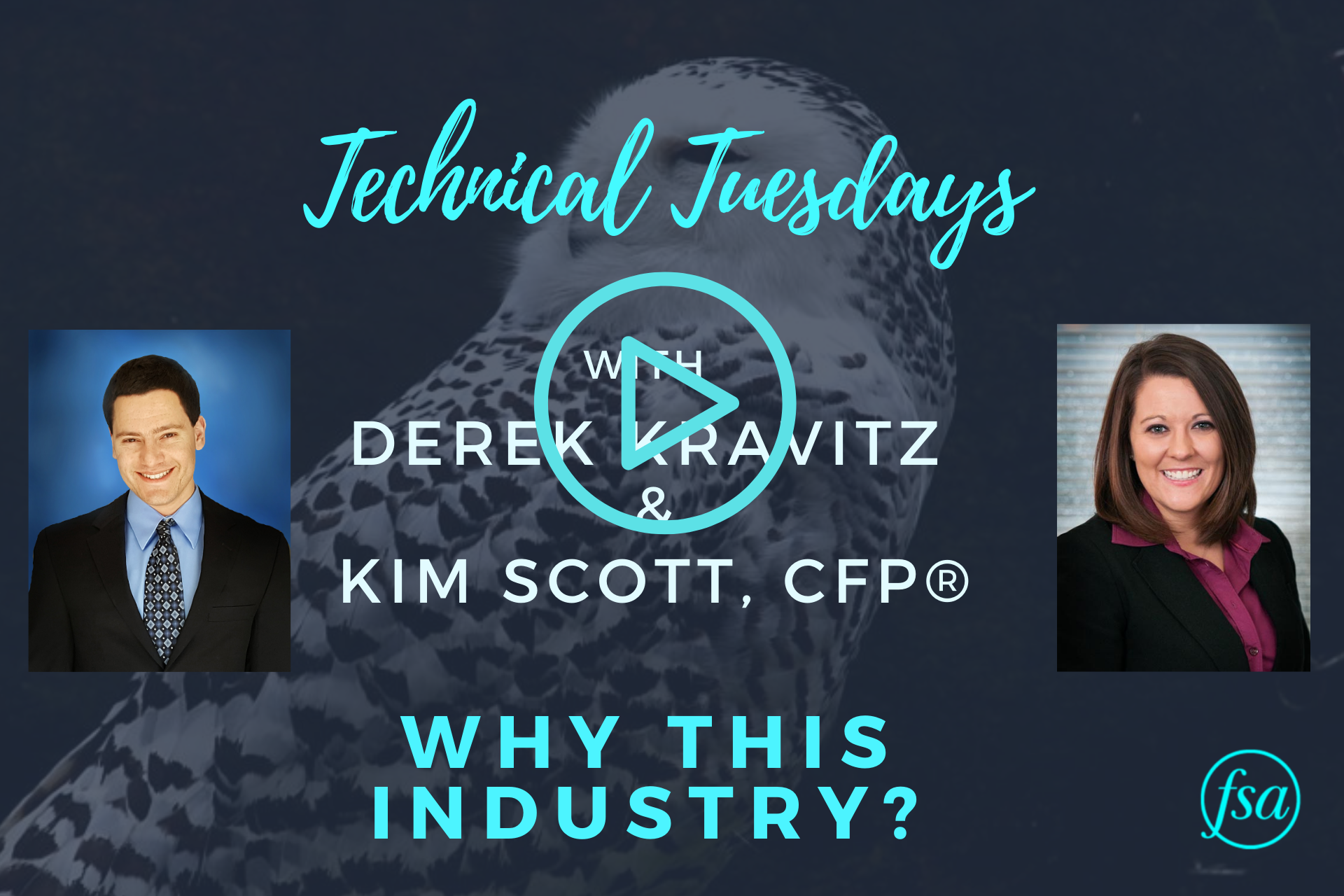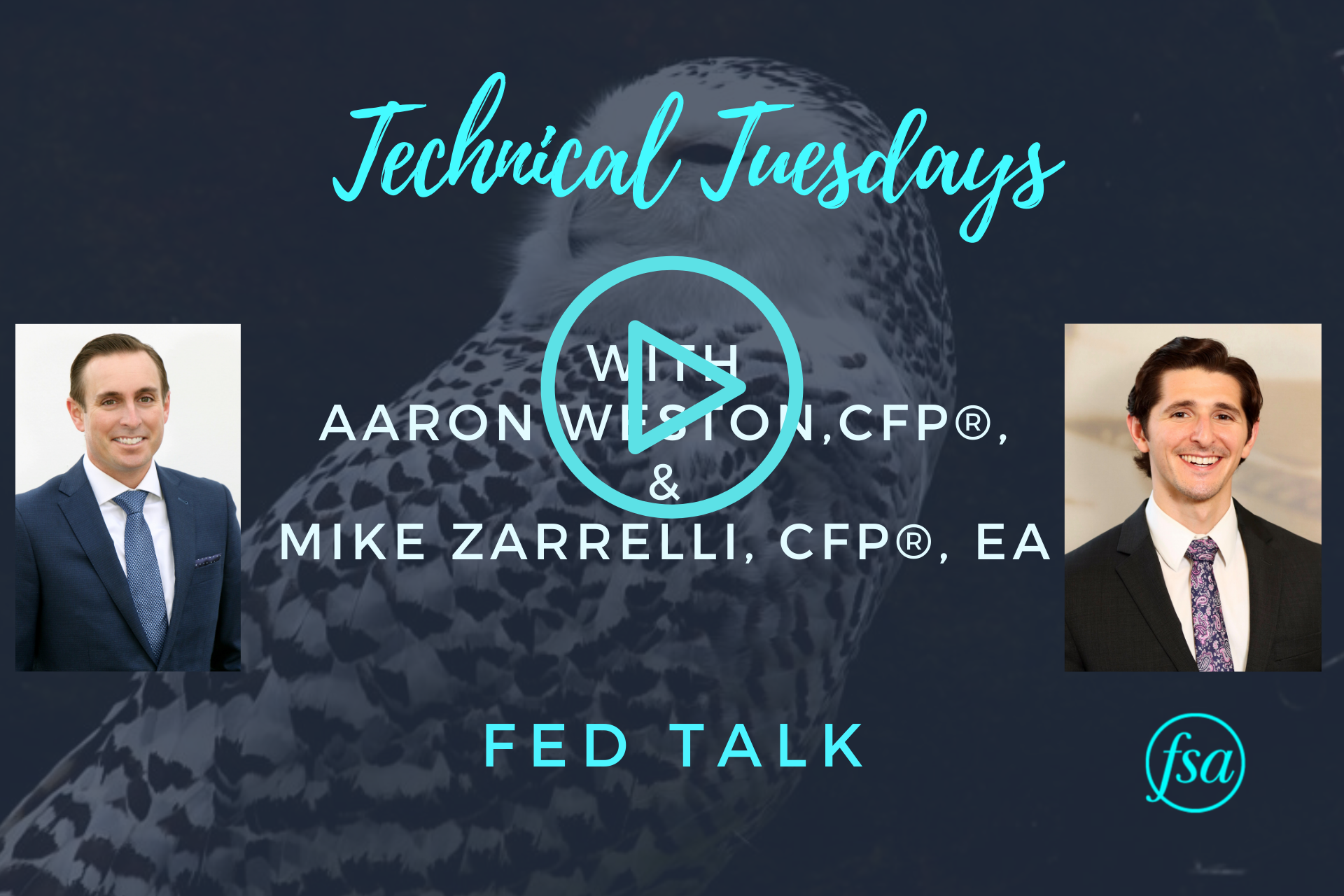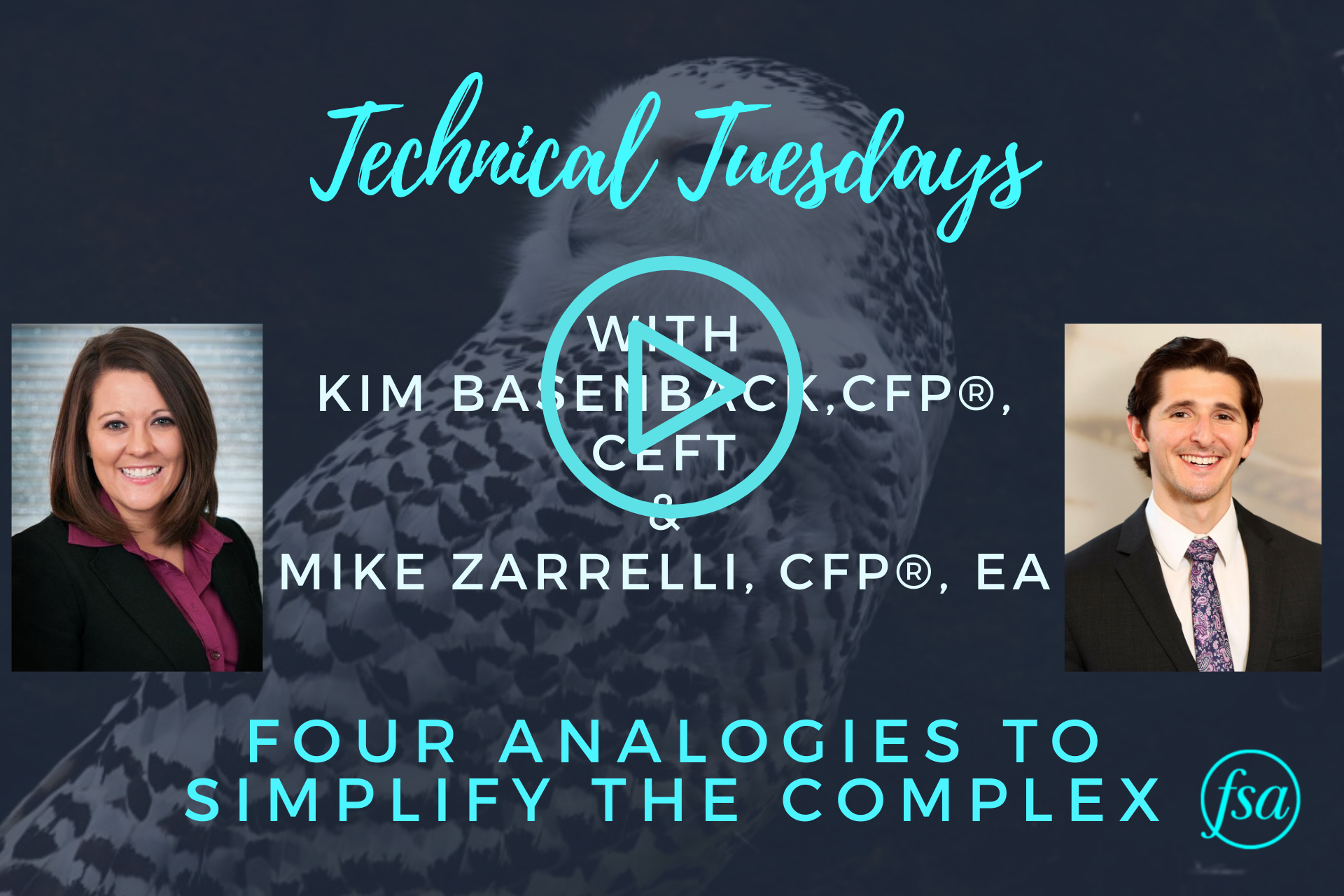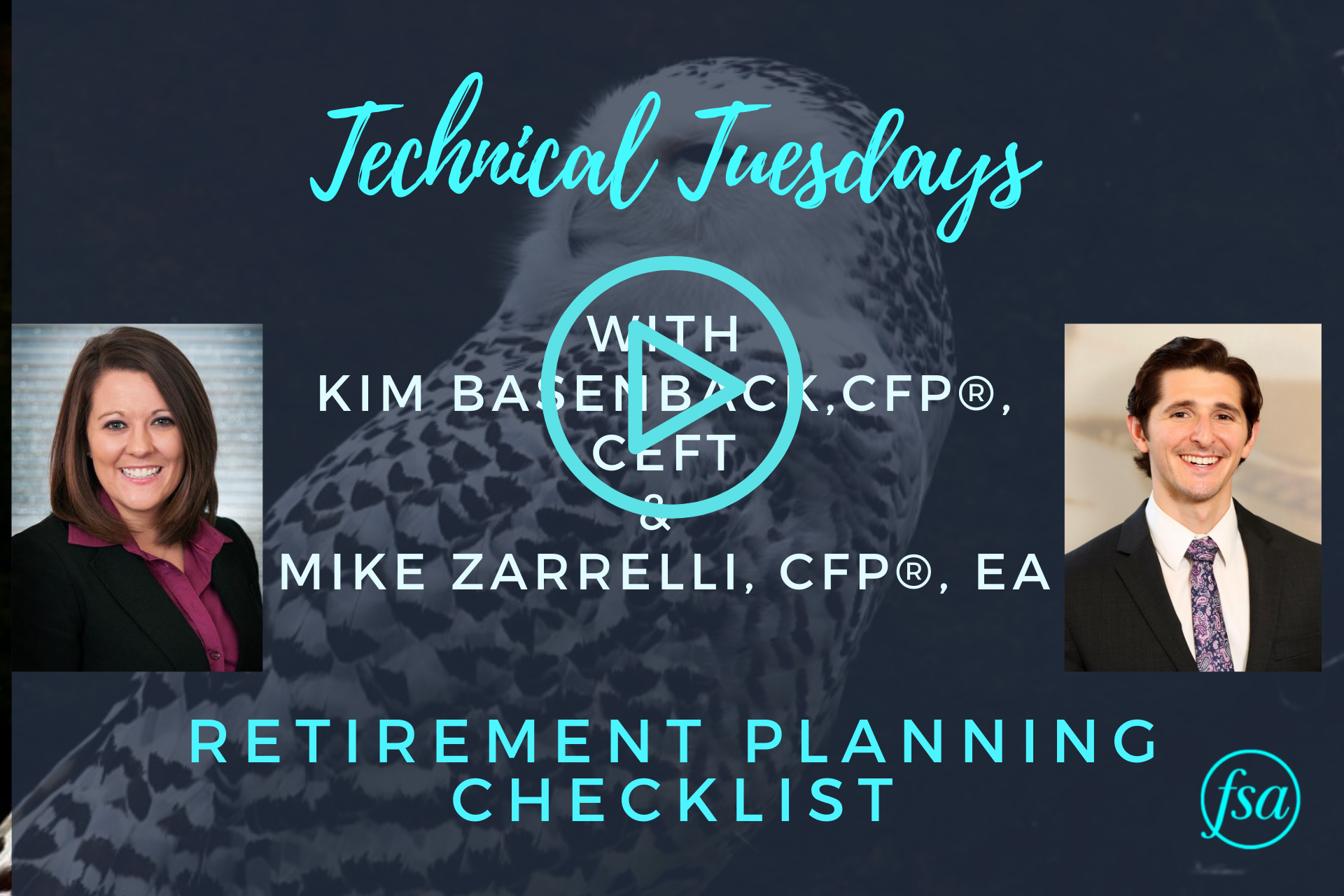Kim Scott, Director of Financial Planning, and Derek Kravitz, Investment Analyst, share a little about themselves and tell us why they chose to get into this industry.
Why This Industry Transcript
Kim:
Hey, everyone. Welcome to Technical Tuesday with Financial Services Advisory. I’m Kim.
Derek:
And I’m Derek.
Kim:
And we’re joining you in a little bit of a different format this time. We thought it’d be kind of fun to come to you with more of a conversation where Derek and I are going to answer some questions that we get from you, questions that we get from friends and from clients, whether it’s on the financial planning side with me or on the investment side with Derek.
Derek:
Yeah, that’s right, Kim. Hopefully, we can bring you guys a new format that’s both entertaining and informative. For our first episode today, we thought it would be kind of fun just to give a little bit of a deeper introduction of both of who we are and why we were brought into this industry and why we like it and what keeps us here.
So, without further ado, Kim, I guess I’d be curious, what brought you into this industry? Why do you like planning and what keeps you around?
Kim:
Yeah. So for me, I feel like it started a while back. Growing up with a single mom, finances were always something that I was aware of, especially if it was on the lacking side, and then going into college, it was kind of understood that we all were putting ourselves through school. So I became more aware of balancing a checkbook, of the need to work hard and make sure that you’re bringing in enough to cover your expenses. I educated myself on the loans that I was getting. I ended up becoming more of a go-to person with my friends on things like, what does credit mean, what is this loan that I’m getting, and what does this look like. I found that it was kind of fun being that go-to person.
A combination of things brought me to financial planning. I actually didn’t start that way when I went into college; I was more of a business major. But I found out about financial planning, and it was a combination of all the things that I love to do – from math and solving puzzles and diving into the numbers, to getting to know people and what they’re passionate about and what they love to do, and kind of bringing those two worlds together just felt like a perfect fit. I do feel like that’s been the reality once I lived into it, so that’s what keeps me there.
I would say my why is wanting to help people dream about the future. I know that that wasn’t quite the option necessarily for my mom in the beginning; she had to get through some hard times and some people do. But a lot of that comes with education. So it’s helping to educate people and helping them to realize what they need now and what they need for the future. It’s an exciting opportunity to get to know people on the level of what they’re excited about and what they’re dreaming about and helping them figure out a plan to get there.
Derek:
That’s really cool. That must be really rewarding to work with clients over a number of years to get them to that end goal where they’re able to go out and just enjoy what they like, whether it’s a hobby or traveling, or what have you, to be able to get them to a position where they feel secure enough that they can go do that, right. I imagine that’s pretty rewarding.
Kim:
Oh, absolutely. I just think that, to your point of why does it keep me here, that’s exactly it. The reward of getting to see, especially as I worked with clients for years, the progress that they’ve made and seeing some of those dreams, even if it’s on the shorter term, come to fruition. So absolutely.
And Derek, I’d like to ask you the same question. What is your why? What’s your path that brought you into the investment world and what keeps you here?
Derek:
Yeah, thank you. I appreciate the inquiry because I also noticed that I think we have some similar backgrounds, too. I was raised in a middle class household, single mother as well. I saw from a young age, the importance that I think financial independence would bring to me in my future. If you’re not beholden to anyone, especially as you get into your older age, I think that that brings a lot of value and peace of mind. So, I’ve always been fascinated by money and just, I guess, the independence I always equated with it just from being taught through both my experiences and from my mother growing up.
Yeah, I mean, I kind of zigged and zagged to get to where I am today. I actually went into college thinking that I was going to go into the State Department as a foreign diplomat abroad. And sort of what happened was I got some high school graduation money, and I had always been a bit interested in the stock market, so I opened a brokerage account, and I put a few thousand dollars in, and I remember buying my first stock. It was Citigroup, and this is 2010. It’s right after the great financial crisis and banks were absolutely decimated. I thought, “Hey, you know, banks always seem to win in the end. I’ll buy some bank shares.” I remember Citigroup was trading at $4 and I bought 100 shares and I remember selling it at probably 4.50. I made $50, and I thought I was king for a day. I thought it was so cool that you could make money trading stocks, and I was absolutely hooked from then on out.
Now, the ironic part is that later that same account, I ended up losing most of that money, getting a little bit more aggressive, but I would call it the hard knocks of the market, learning that it’s not as easy as it looks. It’s actually a complex mechanism that takes a lot of understanding. It’s not a casino that some people might equate it to. But you can make money if you’re disciplined. I think that I decided to stick it out and just try to learn from my own mistakes and from the mistakes of others.
So freshman year of college, sophomore year of college, I was still on that international affairs track and thinking I was going to end up in the State Department. What I noticed about myself was that I would be in my class or my lecture, and I would be checking stock quotes and looking at stock charts at whatever was moving that day, and it kind of dawned on me one day. I said, “You know what; I should probably consider an alternate career path if this is really where my interest lies.” And sure enough, I ended up pursuing that. I ended up graduating with an international affairs degree because I decided that the education in that space was still worthwhile and very helpful for understanding I think our global world today.
But I’ve nonetheless pursued this career track instead just because it’s absolutely fascinating. Every single day, there’s something new going on. There’s never a dull market as a market observer, if you will. I guess that’s what keeps me here, my why, is it’s fascinating. And also, I think that it’s a way for me to help in the goal that , what you’re accomplishing on your end on the advice side is helping people secure their financial freedom; on my end, we’re handling the investment side. So I feel like we have sort of the same goal there, just a couple of different ways of approaching it as a team. I really like my corner, if you will, of how I participate in getting folks to that end goal as well. I guess that’s my why, as well.
Kim:
Derek, that’s awesome. Thanks for sharing. It’s really interesting to hear your first purchase of Citigroup. I was curious about that. Do you have any other individual stock picks that happened for you early on that stick out to you, whether it was a big win or maybe not such a good choice?
Derek:
Yeah, so I think it’s only fair to talk about – that’s a great question – and I feel like it’s only fair to highlight everything that happens, not just focus on the wins because I want to paint a realistic picture of how hard this is. I got caught up in what I would call a penny stock frenzy, and a lot of people that first start trading stocks, they get, I think, intrigued by these companies that are listed for a penny, two pennies, three pennies on the OTC markets which is called the over-the-counter. It’s not even traded on major exchanges.
And so I ended up buying, call it like three million shares of this company that was valued at 1/100th of a penny. I found the cheapest thing I could. I’d screened for what’s the cheapest possible share price I could find and how much of it can I buy. I put maybe $300 or $400 into it, and it never went anywhere. In fact, it went bankrupt. I would call that an inexpensive lesson in the long run, that this is not easy, and it is important to know what you’re doing because otherwise the market could just very well take your money and run.
Derek:
That one wasn’t a success story, but my friends had fun messing with me and saying, “Oh yeah, you own three million shares of something. Oh yeah, yeah. By the way, that thing is worth 1/100th of a penny.” Yeah, that would be the other cautionary tale side of that story, I would say.
Kim:
That’s great. That’s great. Yeah, we appreciate you sharing on both sides. And Derek, I think you said it well in your why, that we both align in wanting to help people on the path as far as their future and what’s ahead and helping them reach their goals. So, I will just reiterate that’s our hope during these Technical Tuesday videos is to give you nuggets, help educate you in areas of finance, and help you along that journey.
Derek:
Absolutely. Yeah, this has been fun. Thanks for taking the time today, Kim. To our viewers, I hope that you were entertained and in any way informed. Hopefully, this will be the first of many episodes that Kim and I do.
Kim:
Great. Thanks guys.
FSA’s current written Disclosure Brochure and Privacy Notice discussing our current advisory services and fees is available at www.FSAinvest.com/disclosures or by calling 301-949-7300.




